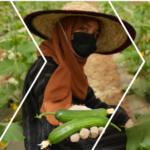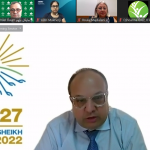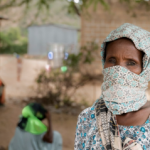The Near East and North Africa (NENA) region faces a growing number of complex, overlapping and compounding hazards that are undermining livelihoods, deepening food insecurity and slowing economic development. Increasingly frequent and severe climate extremes – such as droughts, flash floods, heatwaves – are converging with transboundary plant and animal diseases, protracted conflicts and economic volatility. These risks disproportionately impact the agricultural sector, which remains a cornerstone of rural livelihoods and food systems in the region..
2023 Global Food Policy Report: Rethinking Food Crisis Responses
The past decade has been marked by multiple, often overlapping, crises. The COVID-19 pandemic, various
natural disasters, and the ongoing war in Ukraine have all threatened the fabric of our global food systems. This string of crises has left an indelible mark. In too many places, progress in reducing poverty and
malnutrition has been reversed, with long-term implications for people’s health and livelihoods
CGIAR Borlaug Dialogue 2022 side event: Egypt’s COP27 plans and the role of CGIAR
On Thursday, October 20, 2022, The International Food Policy Research Institute (IFPRI), The International Center for Agriculture Research in the Dry Areas (ICARDA), and CGIAR’s Initiative: National Policies and Strategies (NPS) jointly organized a Pre-COP27 seminar: Accelerated Action for Food Systems Resilience: Egypt’s Plans for Cop27 and The Role Of CGIAR. The virtual seminar was also live-streamed as Borlaug Dialogue side event. This event was inspired by Egypt's Presidency of COP27 and hence the main objective of the event was to highlight Egypt’s priorities for COP27. The event also covered discussions specific to Egypt’s agri-food sector as well as CGIAR’s research portfolio and plans for COP27. The event brought together representatives from Egypt's Presidency of COP27 and several senior leaders and climate scientists from CGIAR.
NEW PUBLICATION: Ethiopia’s social safety net effective in limiting COVID-19 impacts on rural food insecurity
By Kibrom A. Abay, Guush Berhane, John Hoddinott, and Kibrom Tafere
Multiple studies have documented the negative impacts of COVID-19 on the poor and vulnerable. Over the past decade, rigorous evaluations have shown Ethiopia’s Productive Safety Net Program (PSNP) yielding positive results in addressing household poverty and food insecurity in the low-income districts it targets. As the pandemic suddenly raised economic stresses on poor households, a new study by Kibrom Abay, Guush Berhane, John Hoddinott, and Kibrom Tefere shows the PSNP has been [...]
Is Humanitarian Food Aid Enough to Tackle Food Insecurity in Yemen?
Francesco Di Bona - MA in Development Economics and International Studies, Friedrich-Alexander Universität Erlangen-Nürnberg, Germany
In crisis and conflict contexts, food assistance is used as a main form of humanitarian aid. Food insecurity can be tackled directly through food basket transfers or school feeding programmes, or indirectly through cash or voucher transfers, with the latter that can be redeemed in supermarkets. Lately, cash transfers have been on the rise as a humanitarian food aid measure. The World Food Programme (WFP) has been [...]





